As you probably already know, the vinyl industry is booming today. More and more people want to own the coveted turntable and experience the famous “warm analog sound” they’ve heard so much about. Of the two main types of turntables, direct-drive models represent the higher category of turntables, offering less “wow,” jitter, and speed mismatch due to more accurate and stable velocities. In addition, these devices are geared towards DJs, which also makes them even more desirable.
That is why I invite you to join my search for the best direct-drive turntables. It will save you time choosing the most optimal model, and for me, it will be another interesting experience. Over many years in this field, I have gained the insight to objectively assess which models in different price ranges deserve your attention.
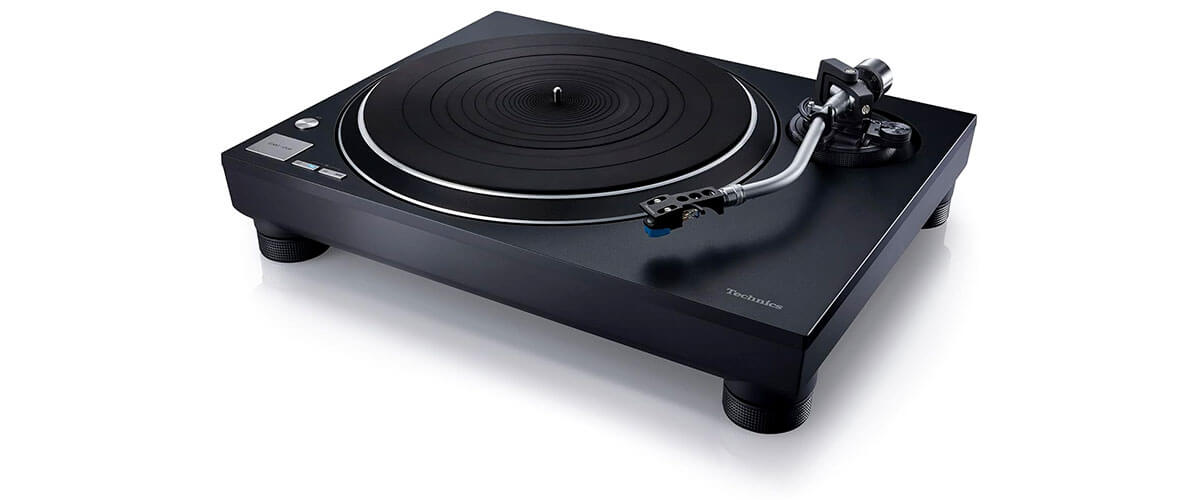
Turntables direct drive comparison table
| Name | Drive type | Operation type | Speeds | Phono Pre-Amp | Bluetooth | Review |
|---|---|---|---|---|---|---|
| Technics SL-100C best overall | direct | manual | 33 1/3, 45, 78 RPM | yes | no | Review |
| Audio-Technica AT-LP1240-USBXP alternative pick | direct | manual | 33 1/3, 45, 78 RPM | yes | no | Review |
| Denon DP-3000NE premium pick | direct | manual | 33 1/3, 45, 78 RPM | no | no | Review |
| Audio-Technica AT-LP120XUSB budget | direct | manual | 33 1/3, 45, 78 RPM | yes | no | Review |
| Pioneer DJ PLX-1000 also great for DJ | direct | manual | 33 1/3, 45 RPM | no | no | Review |
Key features of direct drive turntables
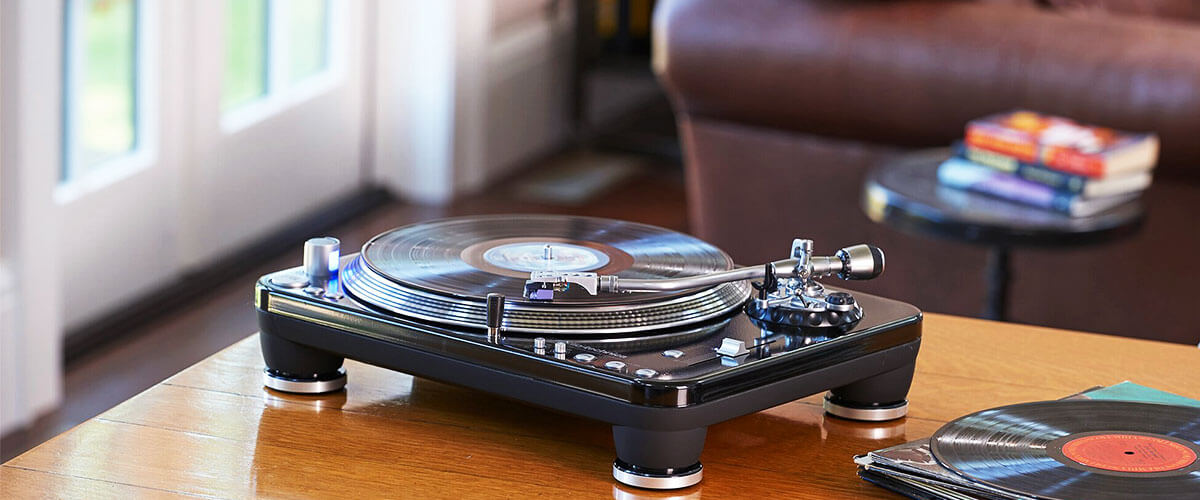
If you are already quite experienced in this subject area, you can go straight to the reviews, but if you are a beginner – don’t worry, you have come to the right place. For convenience, I am going to start with the most basic things. Just to make sure everyone knows what we will talk about today while picking the best direct-drive turntable.
Motor and drive mechanism
The platter is directly connected to the motor rotor in direct drive turntables with a robust coupling. Since no belts, wheels, or other components offer support, the whole construction becomes more reliable. Plus, it reduces friction, which results in speed consistency. Without fluctuations in rotating speed, the platter maintains a more constant velocity to precisely control the vinyl record’s reproduction speed. Lastly comes the most intriguing aspect of today’s review – considering there are no elastic belts that can stretch and slip, direct turntables require less maintenance, and it’s often done way more easily.
Speed stability and accuracy
However, that wasn’t the coolest news. You see, the exceptional speed stability of direct drive turntables results in greater playback accuracy and audio fidelity. As you know, the turntable speeds are 33, 45, or 78 (very rarely) RPM, but you may not know that given the same price range, direct-drive turntables are generally way better at stability and maintaining those speeds. As a result, you get fewer fluctuations, which even decreases the wow and flutter distortions, delivering high-quality sound.
High-end DJ turntables utilize quartz-locked motors and even have strobe marks on the platter with adjustable pitch sliders for tuning accuracy down to 0.01%. This level of speed precision is critical for both Hi-Fi listening and scratch DJ mixing applications, where even minute tempo variations can negatively impact sound quality.
Torque and start-up times
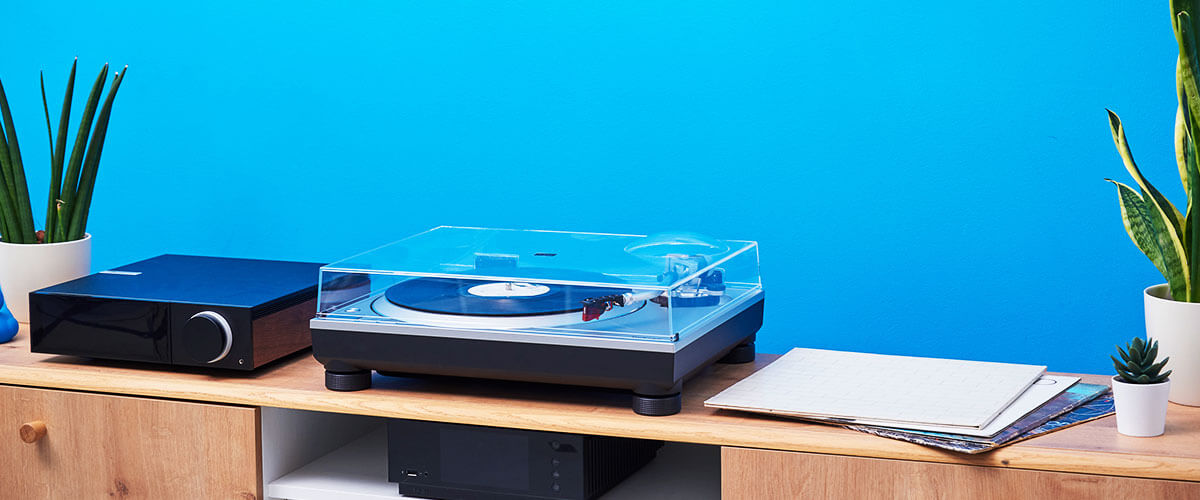
Direct drive offers another cool perk – such turntables are designed with high torque in mind. While it may sound a bit complicated, it’s actually quite simple. The higher the torque, the quicker the turntable will start and accelerate to the full speed needed for quality playback. Also, this is important for those really weighty and stable turntables. It works as a simple system; a heavy pallet is hard to bring to motion, but when you finally do, it remains stable.
Guess what? High torque is exactly what is required to bring those pallets to speed faster. Thus, for domestic listening, the high torque motors ensure unwavering speed as the stylus tracks the record grooves despite shifts in density and amplitude. Fast spin-up reduces distortion on inner grooves after tonearm queuing. Additionally, it also allows DJ techniques like back spinning and scratching at different speeds.
Durability and longevity
As I have said before, by eliminating belts, wheels, and intermediary drive components, direct drive turntables contain fewer elements that can wear out over time. These simple parts, when properly maintained, show great longevity. It doesn’t mean that you won’t have to maintain it at all. But in this case, simply occasional bearing lubrication and cartridge replacement is a good way to keep it functional for a long time. On the DJ side, you definitely will enjoy this durability and continued performance night after night.
Best direct-drive turntable reviews
Technics SL-100C – best overall

To be honest, I’ve been waiting for the opportunity to test the Technics SL-100C turntable for quite some time. Looking ahead a little, I can’t say that it makes every single record come alive, but here is a little spoiler – the quality is there. But let’s talk about everything step by step.
Right out of the box, the simple yet elegant design of the SL-100C makes an impression with its sleek black finish and aluminum platter. The manufacturer definitely knows how to make an entrance. The hefty 21.82 lbs weight promises decent stability. It is also bolstered with a reliable rubber bottom that helps to absorb vibrations. Its tonearm offers rich adjustment options, and it didn’t take me much to get it ready. However, I have a feeling that it would be a bigger problem if I didn’t have all these years of experience. 6 out of 10 for user-friendliness when it comes to setup.
Returning to the amazing things, the turntable includes good Audio Technica AT-VM95C. It’s a mass-market product, yes, but it is definitely good. This high-sensitivity tonearm with technician-level sensitivity adjustments and range for cartridge balance combined with the precision direct drive motor makes wow and flutter distortion practically non-existent at a remarkably low 0.025%.
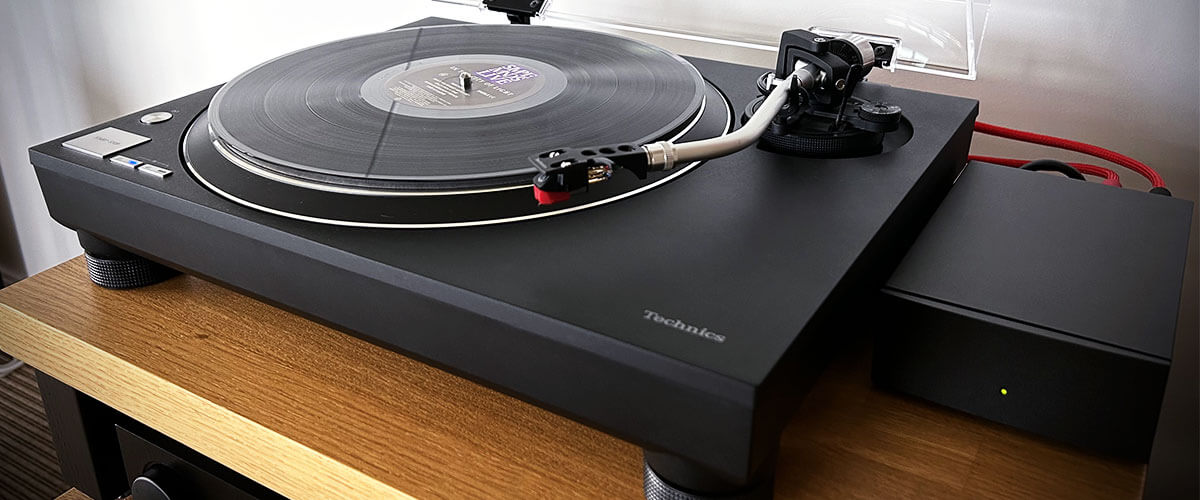
On the listening tests across various genres, from classical to rock to electronic, the SL-100C consistently wowed with its sonic accuracy. The soundstage feels expansive with a clear stereo. When letting my imagination flourish, I could even imagine myself pinpointing the instrument’s position. Yet, I have a very vivid imagination. Highs are airy without harshness, and low frequencies have impactful tone and extension. Vocals sound present with warmth and intimacy. The same goes for micro-dynamics. Don’t expect that you will suddenly reveal new nuances in the old records in this price range, but rest assured that you will hear them in their full beauty.
Honestly, I prefer manual control, but the auto-lifter proves to be very useful for beginners. It saves having to manually raise the arm when the record ends, minimizing wear on vinyl and stylus. Also, I appreciated the inclusion of handy accessories like a slipmat, plastic record sleeve, cartridge balance, and shell wire in case replacements are needed. Their quality is not premium, though. Especially the mediocre dust cover is a clear disappointment. It is prone to scratching, which is an offensive design flaw.
While falling short of the premium elite category, the Technics SL-100C punches well above its class with impressive engineering that makes it comparable to higher-end turntables. For vinyl playback under $1000, it sets a benchmark in flawless rotational stability coupled with an insightful, engaging sound. The Japanese attention to detail in mechanical construction and sonic tuning make this a good direct-drive turntable for hi-fi listeners and even discerning audiophiles.
Key specs
- Drive type: direct.
- Operation type: manual.
- Speeds, RPM: 33 1/3, 45, 78.
- Phono Pre-Amp: yes.
- Bluetooth: no.
- USB: no.
- Aux input: no.
Pros
- Included rather qualitative AT-VM95C cartridge.
- High-sensitivity tonearm allows precise adjustments.
- Excellent vibration dampening from hefty chassis.
- Comes with extensive accessories.
Cons
- Mediocre dust cover prone to scratching.
- Setup is more complex than beginner models.
Audio-Technica AT-LP1240-USBXP – alternative pick
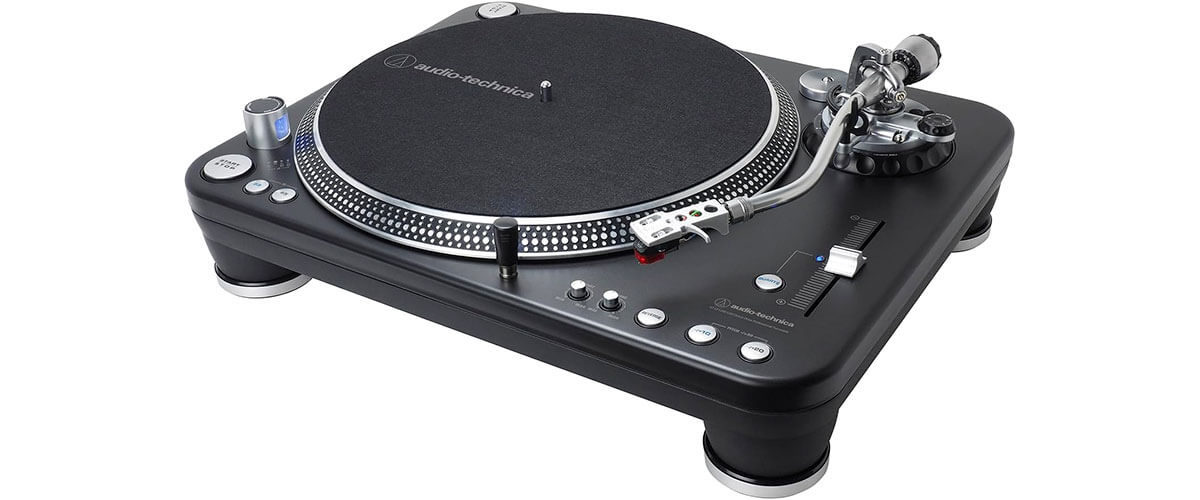
Honestly, when I started working on this review, the AT-LP1240-USBXP was the first one for me to test. Marketed as a “professional DJ turntable”, I was keen to see if it could match up to the promised performance to satisfy both mixing DJs and discerning Hi-Fi listeners. Spoiler alert: it was good, even to the amount that I thought it would hit the first place today, but it still scores second.
Straight out of the box, the AT-LP1240-USBXP cuts a sleek figure in black, centered around its weight of 27.56 pounds, which is a lot, and that’s a good thing. Hence, the die-cast aluminum platter offered a decent level of stability. The whole chassis feels robust – which it must be to withstand heavy use! For controls, Audio Technica keeps it classic with a simple layout, but everything needed to command the decks with precision. It’s pretty user-friendly and simple to operate. On the sore side, it doesn’t offer a 78 RPM speed option. It’s not a must, but it’s something that is better to have than not to.
Setting up took minutes as the quality tonearm and headshell make balancing seamless for the included AT-XP5 cartridge. Audio output routes through the built-in preamp, which can be switched to line-level output as needed. Additionally, startup/brake speeds are tweakable, but I stuck with the defaults, providing all the torque needed to achieve 33/45 RPM in under a second with virtually zero overshoot. Once in motion, the quartz lock and minimal wow/flutter of under 0.1% give reassuring speed stability. Its built-in switchable preamp offers a line-level output and works surprisingly well.
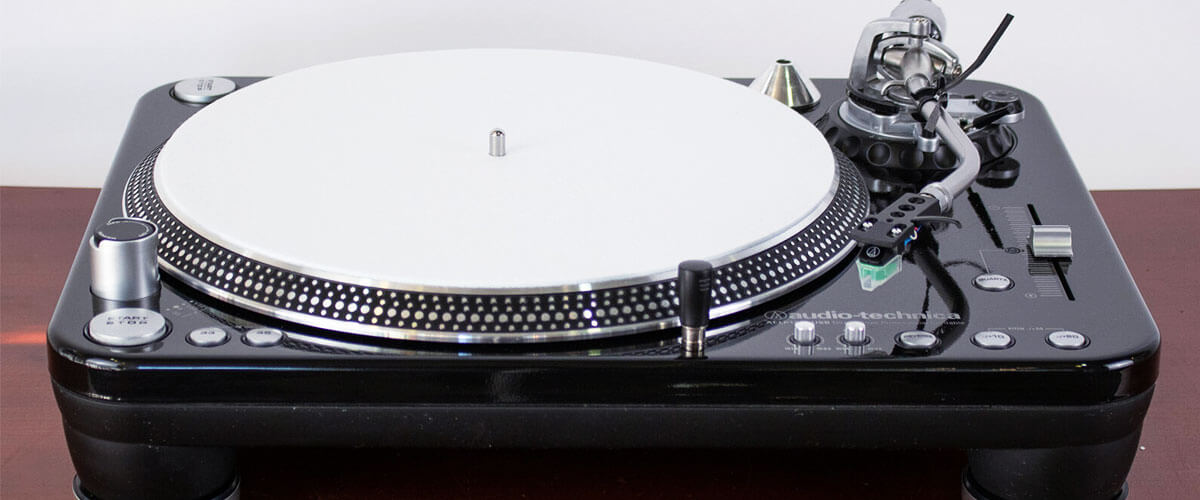
Well, surely there is a USB, and it works, allowing you to digitize any vinyl collection, but are you sure that you actually need It? Because I don’t, but it works. What is even worse is that it has an integrated cable that will be incredibly hard to replace. Real vinyl connoisseurs need only sound, and all “extras” like USB are considered (by audiophiles) superfluous. However, young music lovers can argue and find several arguments in favor of using USBs for any modern device.
The sound quality proves the AT-LP1240-USBXP is no mere club workhorse but a turntable equally suited to pausing and appreciating the subtle details in jazz recordings or classical records. The cartridge profile favors definition over warmth, which suits extended mixing sessions without fatigue. Soundstage imaging feels expansive, with a convincing portrayal of venue acoustics on live recordings.
For under $1000, the AT-LP1240 offers immense flexibility for both DJ and home use thanks to smart design decisions, rugged engineering, and focused performance tuning. It’s simple to use and delivers quality warm vinyl sound. For those who want one investment to handle a spectrum ranging from club mixing to archiving precious records at home, it ticks all the boxes. Yes, it loses to the leader, but it is a great alternative to it, especially if your budget is a bit tight.
Key specs
- Drive type: direct.
- Operation type: manual.
- Speeds, RPM: 33 1/3, 45, 78.
- Phono Pre-Amp: yes.
- Bluetooth: no.
- USB: yes.
- Aux input: no.
Pros
- Offers incredible speed stability.
- Multi-function switchable preamp with line-level output.
- Integrated cabling minimizes setup complexity.
Cons
- Integrated USB cable can’t be replaced if damaged.
- No 78 RPM speed option.
Denon DP-3000NE – premium pick
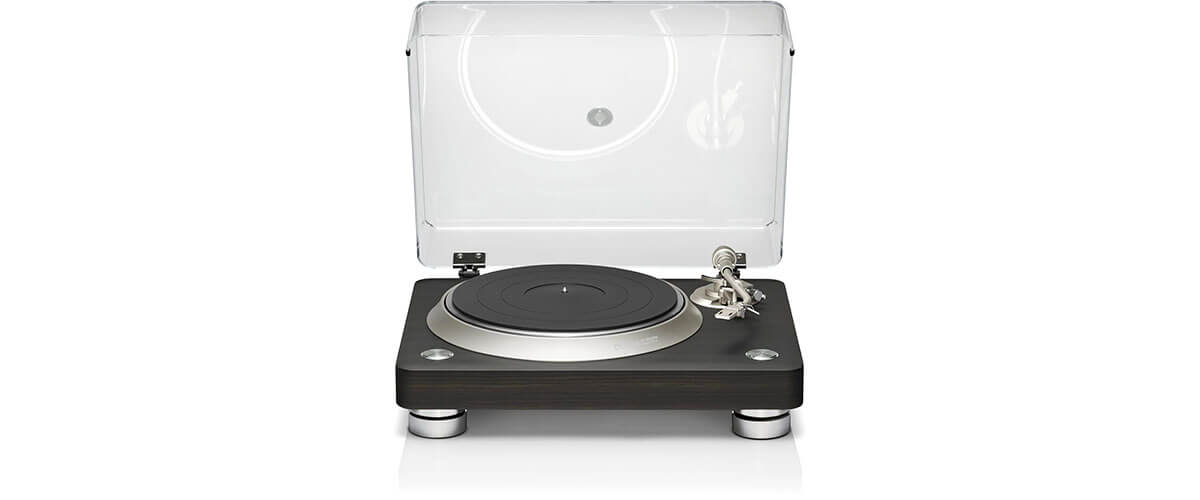
Now, I want to introduce you to the premium model as I somewhat enjoyed the time with the Denon DP-3000NE turntable, promising “premium analog listening pleasure”. I couldn’t wait to drop the needle, so let’s examine how well the retro design backed by modern engineering translates into practical performance. No spoilers here.
At 52.9 pounds, the DP-3000NE conveys sturdy build quality with its dark ebony wood veneer, which I greatly like. Considering my experience, setting it up took minutes, aided by clearly labeled adjustments and comprehensive accessories — Denon designed this with vinyl veterans in mind, but it’s also newbie-friendly. However, I can’t see a newbie making the first steps with DP-3000E. It’s a bit way too much on the expensive side to buy when you are still unsure if you truly love the vinyl sound.
Central to the experience is Denon’s bespoke S-shaped tonearm wired to channel sounds directly using quality copper cabling and gold-plated connectors. Combined with my Ortofon 2M Blue cartridge. Oh, yes. I should stop here because it’s not included. The one I used for the testing was mine. So, keep in mind that you will have to buy your own.
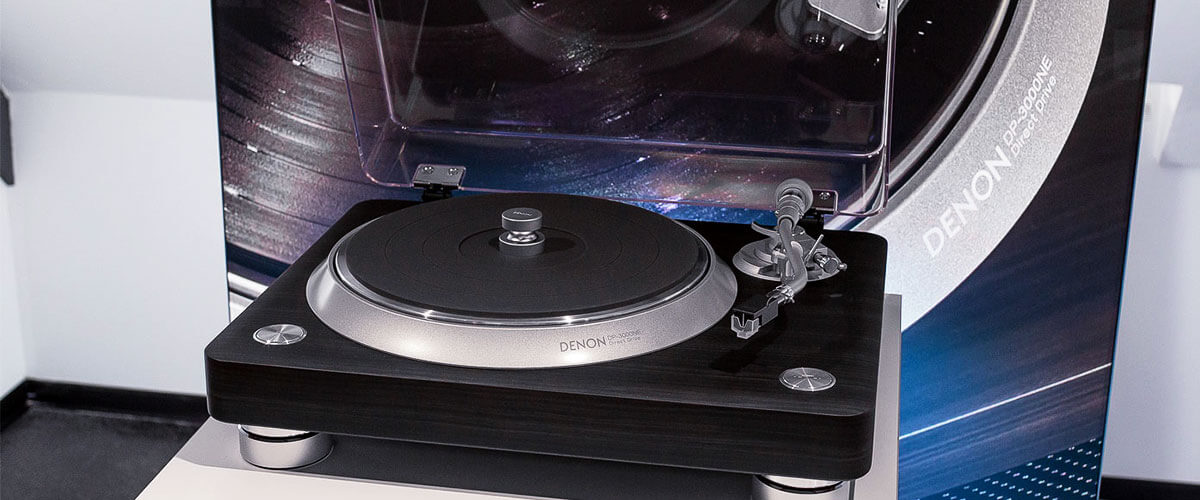
Generally, the moving magnet design smoothly tracks groove undulations. The aluminum die-cast platter’s inertia further assists consistency, evidenced by wow/flutter and rumble ratings that should satisfy even demanding ears. Chained to the direct drive motor, the platter velocity locks to a precise 33/45/78 RPM with minute 0.06% deviations. Yet, the manual changing between the three speeds requires swapping belts – a minor inconvenience for an otherwise intuitive interface.
So, the sound? It’s great! Surely, there is room for improvement. We, audiophiles, always have that, but it sounds amazing. Overall, sound stage imaging projects a wide spectacle within which instruments and vocalists claim distinct spaces.
Yes, this model stands out from the other devices in my review. The details, build quality, and basic elements are really at a premium level. And most importantly, the sound! It is as close to the highest quality as possible. If you have the necessary budget and a strong desire to buy a high-end vinyl player, the Denon DP-3000NE is your optimal option.
Key specs
- Drive type: direct.
- Operation type: manual.
- Speeds, RPM: 33 1/3, 45, 78.
- Phono Pre-Amp: no.
- Bluetooth: no.
- USB: no.
- Aux input: no.
Pros
- Exceptional wow, flutter, and speed accuracy specifications.
- Heavy chassis resists vibrations.
- It is not equipped with a built-in phono preamplifier, which once again emphasizes its belonging to the premium models.
- Gold-plated connectors ensure clean audio signal transfer.
- Provides the highest sound quality of any device in my review.
Cons
- Cartridge and a phono preamplifier are not included — an added expense.
Audio-Technica AT-LP120XUSB – budget
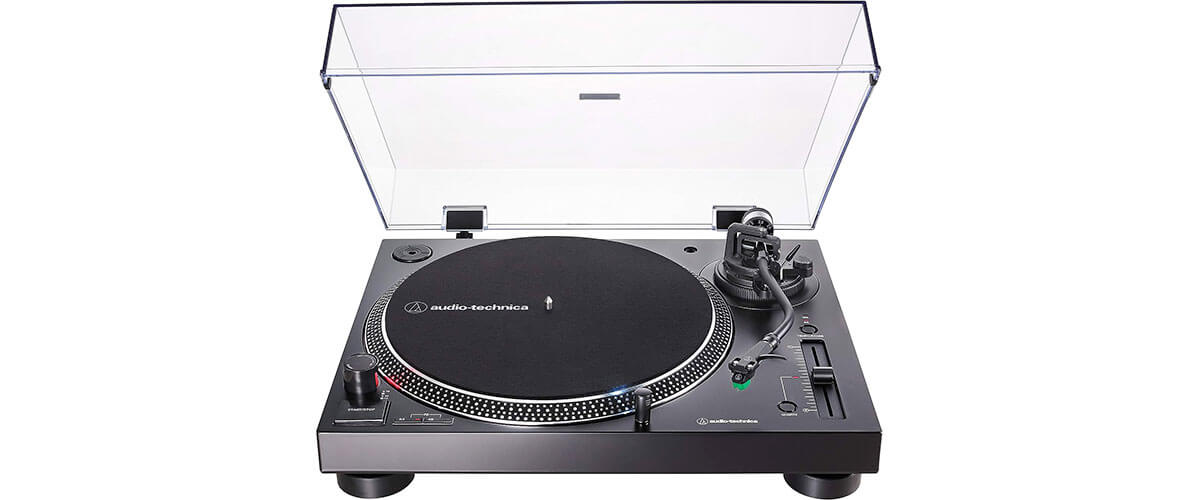
Having personally tested the Audio-Technica AT-LP120XUSB direct-drive record player, I want to share an honest account of my experience with this budget-friendly vinyl player, priced around several hundred dollars. It strikes a balance between classic aesthetics and modern features, catering to those on a budget seeking a straightforward vinyl playback solution. But what can you actually expect from the modern best budget direct-drive turntable?
Unpacking the AT-LP120XUSB revealed a rather sturdy build and a simple design. It looks good and definitely doesn’t give you the feeling of having a cheap toy on your table. I also love that it’s fully manual. In this budget, paying for automatic features is way too much. The adjustable dynamic anti-skate control offered some flexibility, though not as refined as higher-end models. With selectable speeds of 33/45/78 RPM, it suits a variety of vinyl records. Also, the electronic brake system ensured stops were controlled but lacked the finesse found in more premium options.
The AT-VM95E Dual Magnet phono cartridge, with its elliptical stylus, delivered a decent audio experience. The balanced S-shaped tonearm, coupled with hydraulically damped lift control and lockable rest, performed adequately for the price range. The included AT-HS6 headshell provided nice comparability for cartridges. Then comes the USB. Well, you already know my opinion about that. It’s here, and it works. That’s all.
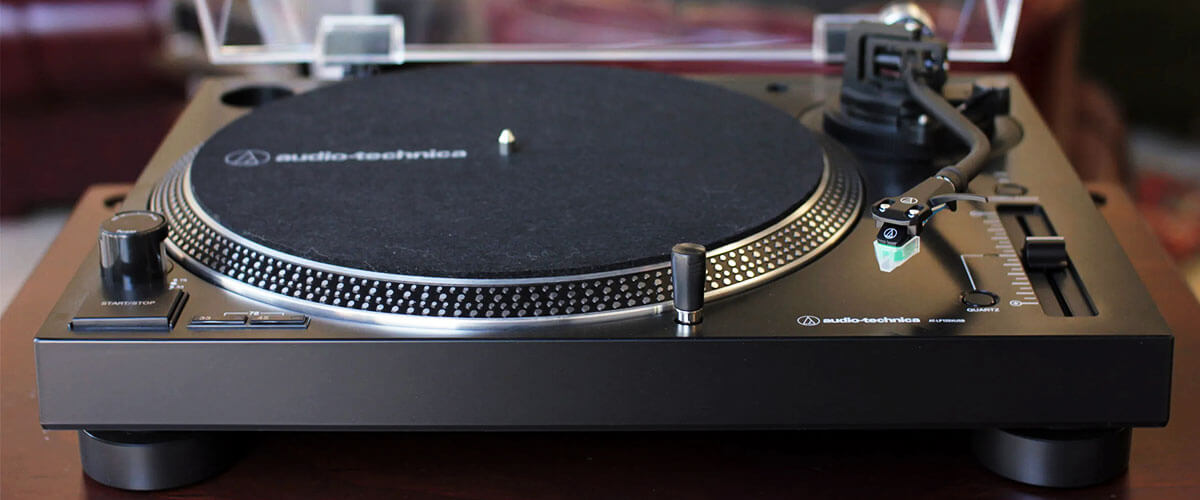
Finally, when talking about sound, I can say that the AT-LP120XUS offers decent vinyl sound. It’s a perfect match as a hobby machine to enjoy music with your friends and loved ones. It will also easily justify your desire to start building a collection of vinyl records. Just don’t expect miracles, and its sound won’t disappoint you.
In all honesty, the Audio-Technica AT-LP120XUSB turntable caters to budget-conscious users seeking basic vinyl playback. While it doesn’t boast premium-like qualities, it fulfills its role adequately for the price point, making it a reasonable option for those entering the world of vinyl on a budget.
Key specs
- Drive type: direct.
- Operation type: manual.
- Speeds, RPM: 33 1/3, 45, 78.
- Phono Pre-Amp: yes.
- Bluetooth: no.
- USB: yes.
- Aux input: no.
Pros
- Fully manual operation for hands-on vinyl control.
- Balanced S-shaped tonearm with damped lift control.
- Decent overall sound quality for the price.
- Good starter option for getting into vinyl.
Cons
- Adjustable anti-skate lacks the refinement of premium models.
- Electronic brakes are less precise than pricier options.
- Sound quality is no match for a bit more expensive models.
Pioneer PLX-1000 – also great for DJ
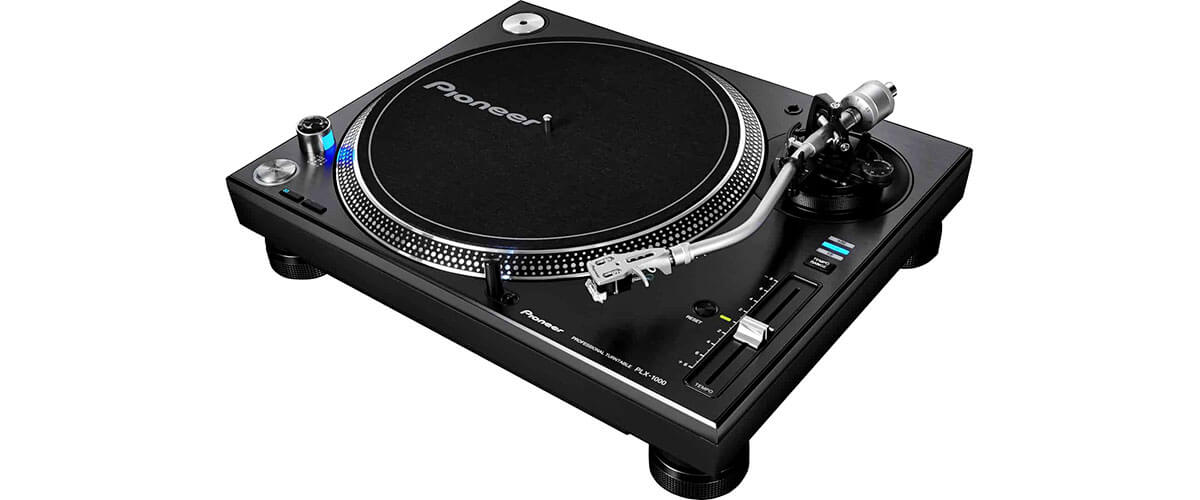
If you remain dissatisfied with the information provided in this review and are in search of a high-end direct-drive turntable, there is another model that I want to share with you as much as I was keen to test the Pioneer PLX-1000 — a classic DJ turntable balancing battle tool utility with audiophile finesse.
Setup took minutes — basic but built intuitively for fluid manual control with thoughtful markings and adjustable counterweights. The weight of 32.19 lb combined with aluminum and die-casting diameter plate offers stunning stability. Wow, and flutter is essentially eliminated. However, there is also a drawback — no other functions apart from the pitch range are present. It is a bit disappointing. With some records, it is prone to significant hum and feedback. So, be ready for this.
Remember when I said about DJs in the header? The direct drive motor provides immense torque, spinning the aluminum platter up to speed in milliseconds with a flick of the power switch. Once the selected 33/45 RPM is reached, the quartz lock and servo control circuits ensure unwavering tempo accuracy for reliable performance. Hence, operating the PLX-1000 brings out one’s inner DJ with its instant start/stop responsiveness – scratched records, juggled cues, and seamless mixes translate perfectly into output thanks to its precise engineering.
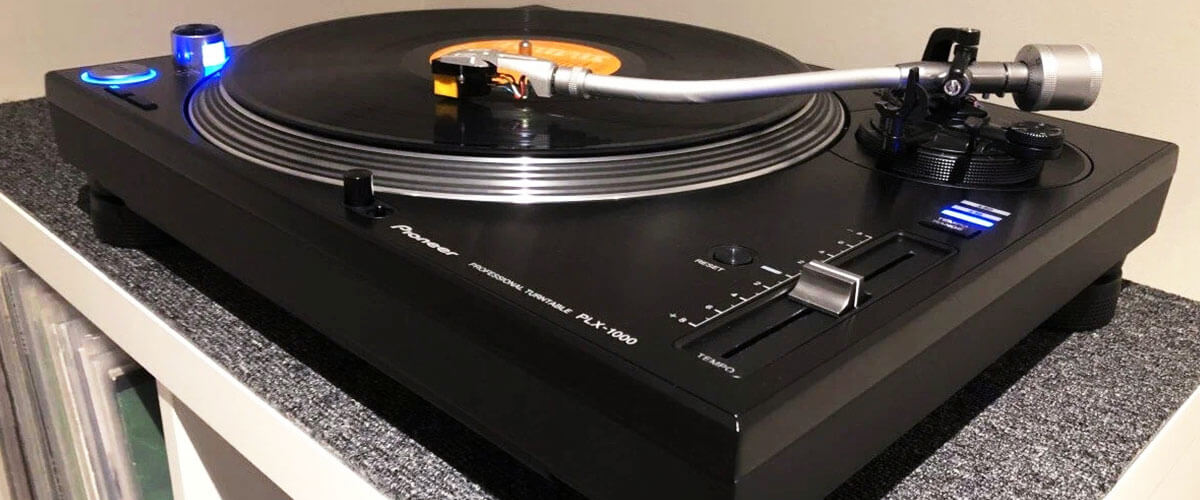
After extended listening, the sound carries that quintessential analog warmth, allowing the rediscovery of nuances in favorite records. However, be attentive to the tonearm since you may face slightly loose bearings of the tonearm and, to some extent, resulting in damped cueing. Mine unit was fine in this regard, but we have already faced one with the same problem in the workshop.
So, overall, the PLX-1000 is a solid choice but not the greatest. It might interest those looking for a model focused on DJ capabilities. It is good at that! But I remind you that it also has the loudest hum in this review. Also, pitch range control is the only feature it offers. I could say that apart from these aspects and a problematic tonearm bearing, Pioneer succeeds in the PLX-1000 as a contemporary DJ turntable fitting both club and audiophile contexts.
Key specs
- Drive type: direct.
- Operation type: manual.
- Speeds, RPM: 33 1/3, 45.
- Phono Pre-Amp: no.
- Bluetooth: no.
- USB: no.
- Aux input: no.
Pros
- Good workmanship and high-quality materials.
- Familiar and good handling.
- DJ-oriented.
Cons
- Noticeable hum and feedback.
- Pitch range control only without other features.
- Tonearm bearing tends to get loose.
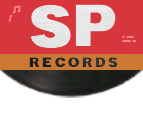
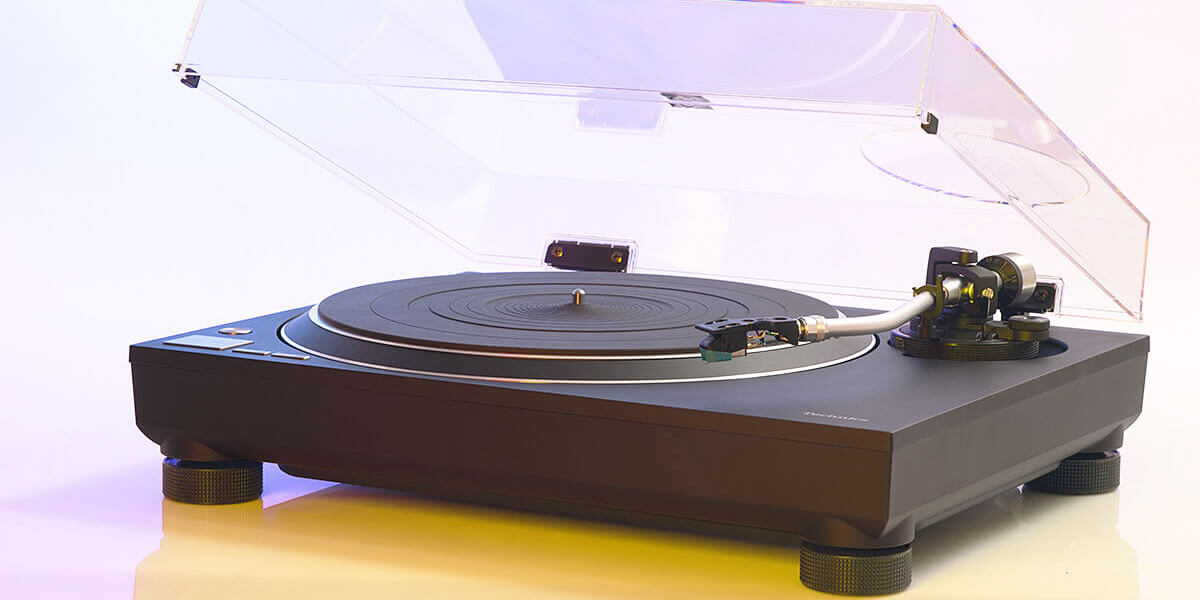
![Best Belt-Drive Turntables [Top Picks]](https://www.sp-records.com/wp-content/uploads/2024/03/best-belt-drive-turntable-300x150.jpg)
